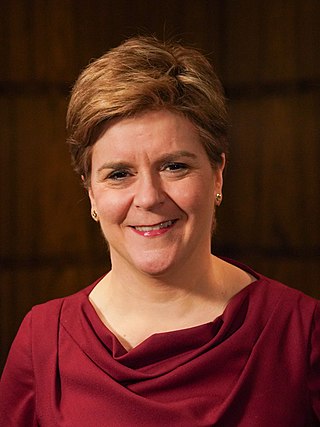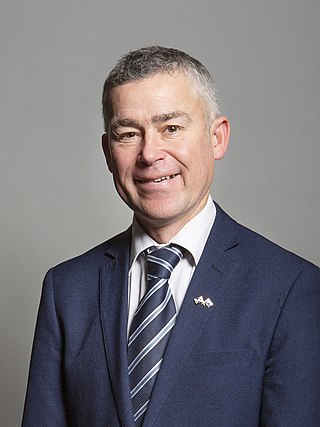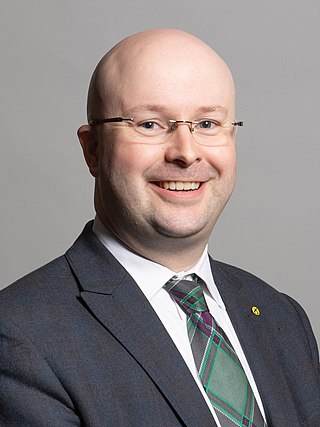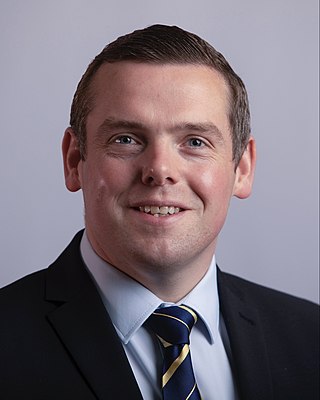Related Research Articles

Nicola Ferguson Sturgeon is a Scottish politician who served as First Minister of Scotland and Leader of the Scottish National Party (SNP) from 2014 to 2023. She has served as a member of the Scottish Parliament (MSP) since 1999, first as an additional member for the Glasgow electoral region, and as the member for Glasgow Southside from 2007.
Parliaments and legislative bodies around the world impose certain rules and standards during debates. Tradition has evolved that there are words or phrases that are deemed inappropriate for use in the legislature whilst it is in session. In a Westminster system, this is called unparliamentary language and there are similar rules in other kinds of legislative systems. This includes, but is not limited to, the suggestion of dishonesty or the use of profanity. Most unacceptable is any insinuation that another member is dishonourable. So, for example, in the British House of Commons any direct reference to a member as lying is unacceptable, even if the allegation is substantively true. A conventional alternative, when necessary, is to complain of a "terminological inexactitude".

Angus Brendan MacNeil is a Scottish politician who served as Member of Parliament (MP) for Na h-Eileanan an Iar from 2005 to 2024.

Ian Graham Davidson is a Scottish politician who served as chair of the Scottish Affairs Select Committee from 2010 to 2015. A member of the Scottish Labour Party and Co-operative Party, he was Member of Parliament (MP) for Glasgow South West, formerly Glasgow Pollok, from 1992 to 2015.
Anti-Scottish sentiment is disdain, discrimination, or hatred for Scotland, the Scots, or Scottish culture. It may also include the persecution or oppression of the Scottish people as an ethnic group or nation. It can also be referred to as Scotophobia or Albaphobia.

Joan McAlpine is a former Scottish journalist and former Scottish National Party politician. She was a Member of the Scottish Parliament (MSP) for the South Scotland region from 2011 to 2021. McAlpine is known for her opposition to the provisions of the legislation which sought to reform the Gender Recognition Act and for her views on sex and gender.

Ian Blackford is a Scottish politician and investment banker who served as leader of the Scottish National Party (SNP) in the House of Commons from 2017 to 2022. He served as the Member of Parliament (MP) for Ross, Skye and Lochaber from 2015 to 2024.

Alan Brown is a Scottish National Party (SNP) politician who served as the Member of Parliament (MP) for Kilmarnock and Loudoun from 2015 until 2024. Brown previously served as the SNP spokesperson on Energy Security and Net Zero (2022–2023), Energy and Climate Change (2020–2022), Transport (2017–2020) and Infrastructure and Energy (2017–2018) in the House of Commons.

Patrick John Grady is a Scottish politician. He was elected at the 2015 UK general election as the Scottish National Party Member of Parliament (MP) for Glasgow North. He was re-elected in 2017 and in 2019, but did not stand again in 2024, after not being allowed to contest nomination to be the SNP candidate.

Joanna Catherine Cherry is a Scottish lawyer and former politician who was the Member of Parliament (MP) for Edinburgh South West from 2015 until 2024. A member of the Scottish National Party (SNP), she was the party's Shadow Home Secretary and Shadow Secretary of State for Justice in the House of Commons from 2015 to 2021.

The 2019 United Kingdom general election was held on Thursday 12 December 2019, with 47,074,800 registered voters entitled to vote to elect 650 Members of Parliament (MPs) to the House of Commons. The governing Conservative Party, led by Prime Minister Boris Johnson, won a landslide victory with a majority of 80 seats, a net gain of 48, on 43.6 per cent of the popular vote, the highest percentage for any party since the 1979 general election, though with a narrower popular vote margin than that achieved by the Labour Party over the Conservatives at the 1997 general election. This was the second national election to be held in 2019 in the United Kingdom, the first being the 2019 European Parliament election.
James Crain Michie was an English poet, translator and editor, of Scottish and American descent .

Douglas Gordon Ross is a Scottish politician who served as Leader of the Scottish Conservative Party from 2020 to 2024 and as Leader of the Opposition in the Scottish Parliament from 2021 to 2024. He served as Member of the UK Parliament (MP) for Moray from 2017 to 2024. Ross currently serves as a Member of the Scottish Parliament (MSP) for the Highlands and Islands, having been elected as a regional list MSP in 2021. He was previously MSP for the region from 2016 to 2017.

A second referendum on Scotland becoming independent of the United Kingdom (UK) has been proposed by the Scottish Government. An independence referendum was first held on 18 September 2014, with 55% voting "No" to independence. The Scottish Government stated in its white paper for independence that voting Yes was a "once in a generation opportunity to follow a different path, and choose a new and better direction for our nation". Following the "No" vote, the cross party Smith Commission proposed areas that could be devolved to the Scottish Parliament; this led to the passing of the Scotland Act 2016, formalising new devolved policy areas in time for the 2016 Scottish Parliament election campaign.
The Scottish National Party depute leadership election ran from 18 May to 8 June 2018. The election was contested for the party's new depute leader following the resignation of Angus Robertson in February 2018, after he lost his Westminster seat in the 2017 snap election.

Stephen Mark Flynn is a Scottish politician who has served as the leader of the Scottish National Party (SNP) in the House of Commons since December 2022. He has been the Member of Parliament (MP) for Aberdeen South since 2019.

James Neale Hanvey is a Scottish nationalist politician who served as the Leader of the Alba Party in the House of Commons from 2021 to 2024, and the Member of Parliament (MP) for Kirkcaldy and Cowdenbeath from 2019 to 2024.

Kaukab Stewart is a Pakistani-born Scottish politician who has served as Minister for Equalities since May 2024. A member of the Scottish National Party (SNP), she has been the Member of the Scottish Parliament (MSP) for Glasgow Kelvin since May 2021.

The 2022 Scottish National Party (SNP) Westminster leadership election was held to choose the leader of the SNP in the House of Commons, following the resignation of Ian Blackford on 1 December 2022. Stephen Flynn and Alison Thewliss were the two MPs who ran in the election. Flynn was elected by 26 votes to 17.

The Frontbench Team of Stephen Flynn is the team of Scottish National Party Spokespersons in the House of Commons since 2022. The frontbench was first appointed on 10 December 2022.
References
- ↑ Bienkov, Adam. "Boris Johnson published a poem joking about the 'extermination' of the 'verminous' Scottish people". Business Insider. Retrieved 2021-12-07.
- ↑ "Outrage at Spectator's poetic attack on Scots". The Herald. 2004-08-13. Archived from the original on 2019-05-18 – via archive.md.
- ↑ "Fact-check: Did Boris Johnson call Scottish people a 'verminous race'?". The National. Retrieved 2021-12-07.
- ↑ Tolhurst, Alain (19 June 2019). "WATCH: SNP's Ian Blackford sparks row after branding Boris Johnson a 'racist' in the Commons". Politics Home.